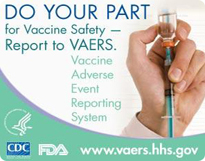 ISTOCK, GOROVITSEverything in science involves uncertainty. And for drugs and vaccines, “pharmacovigilance” helps researchers and patients navigate this uncertainty by gathering and processing information on the side effects of medical products in the post-marketing period. Clinical trials conducted prior to approval are often small (median 760 people) and quick (median 14 weeks), making it a challenge to pick up serious but rare or latent side effects of medicines. (And even if researchers capture rare adverse events, determining causality is difficult.)
ISTOCK, GOROVITSEverything in science involves uncertainty. And for drugs and vaccines, “pharmacovigilance” helps researchers and patients navigate this uncertainty by gathering and processing information on the side effects of medical products in the post-marketing period. Clinical trials conducted prior to approval are often small (median 760 people) and quick (median 14 weeks), making it a challenge to pick up serious but rare or latent side effects of medicines. (And even if researchers capture rare adverse events, determining causality is difficult.)
Active post-marketing surveillance therefore is our safety net, and in the United States, the Centers for Disease Control and Prevention (CDC) and Food and Drug Administration (FDA) run a pharmacovigilance program for vaccines known as the Vaccine Adverse Event Reporting System (VAERS).
But if you use Chrome, Firefox, or Internet Explorer to browse the Web, chances are you will get an error page when trying to connect to the...
If this were a temporary problem, it would not be worth writing about. But I first alerted officials about the problem a month ago on April 25. When the problem persisted for three more weeks, I decided to write about it for The BMJ, where I work. The website remains misconfigured today, on day 28 (at least; I only know when I discovered the problem, not when the problem actually started).
 Screen shot using Chrome (May 16, 2017)PETER DOSHIMaking sense of the problem
Screen shot using Chrome (May 16, 2017)PETER DOSHIMaking sense of the problem
I have long felt that our systems of collecting credible scientific information about a drug’s benefits and harms post-marketing were woefully inadequate. Recent research bears this out. Few drugs are studied in controlled trials post-approval, the majority of post-marketing studies planned are too small to detect rare, adverse events, and many planned studies take far too long to actually commence. What is more, VAERS and the equivalent system for drugs, FAERS, are spontaneous reporting systems—it is estimated that, at most, 10 percent of actual adverse events get reported.
FDA declares post-marketing surveillance to be “a critical part of the FDA’s responsibilities,” but nobody has fixed the VAERS website in at least a month.
Moreover, I searched the Internet for news stories, blogs, or tweets about the outage. Nothing. Has nobody even noticed? The website address is printed on every Vaccine Information Statement (VIS), typically a two-page document that must, by law, be distributed to individuals with every dose of vaccine administered in the US. The CDC tells physicians to “Do your part for vaccine safety - Report to VAERS.” But the address given does not connect.
Impact on data quality
Has the website misconfiguration affected the data? It turns out that the VAERS website is accessible at vaers.hhs.gov—that is, by removing the “www.” from the address. And while VISs point to www.vaers.hhs.gov, many links on the Internet point to vaers.hhs.gov (without the www.). Therefore, the effect on the collection of data into VAERS is uncertain. Only a formal analysis can shed light on this important question. Will the CDC/FDA do such an analysis?
 CDCWhat can we do
CDCWhat can we do
That this is happening with the vaccines’, rather than drugs’, postmarketing surveillance system is particularly unfortunate. The climate for discussions about vaccines is already hostile, and a website address that does not function properly only adds fuel to the fire. At the same time of the outage, the National Foundation for Infectious Diseases (NFID) told more than 750,000 people in a large social media campaign to promote vaccination that “vaccines are safe.” One of the graphics developed for the campaign depicts VAERS as a pillar assuring vaccine safety. Today, this pillar appears to be hollow.
Whether you are pro-all-vaccines, anti-all-vaccines, or one of the many who are neither, we all benefit from robust pharmacovigilance. But the VAERS website outage—and lack of attention it has received—demonstrates there is nothing vigilant about our current system of pharmacovigilance. And it’s time that changes.
I urge anybody who cares about post-marketing surveillance, who agrees with the FDA that it is an “essential” system, to demand that authorities immediately fix the problem, and provide the public with an explanation.
@CDCgov
@US_FDA
@NFIDvaccines
And if you by chance do not feel post-marketing surveillance is important, consider this: US President Donald Trump and the newly appointed FDA commissioner would like to accelerate FDA approvals, which means drugs may soon start entering the market with even more uncertainty over their effects.
Peter Doshi is an associate editor at The BMJ and an assistant professor at University of Maryland School of Pharmacy.
Interested in reading more?




